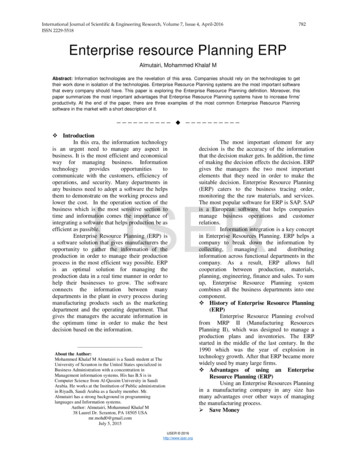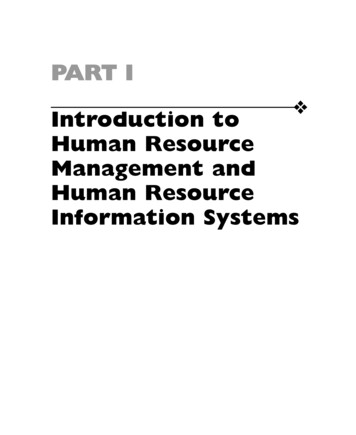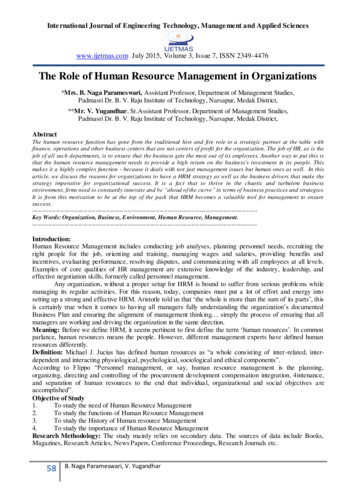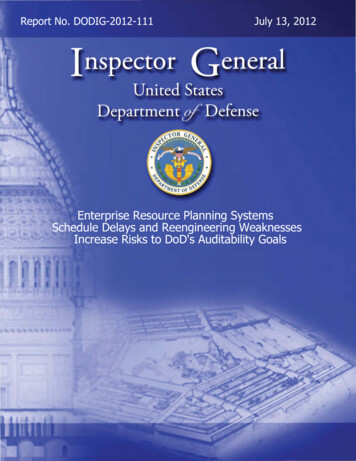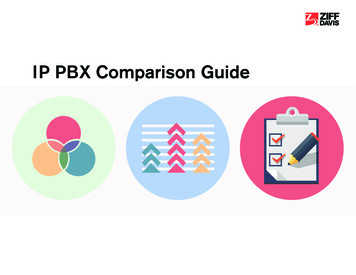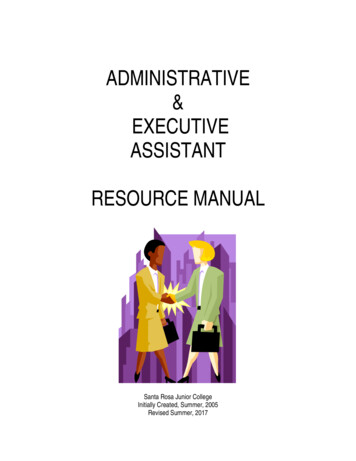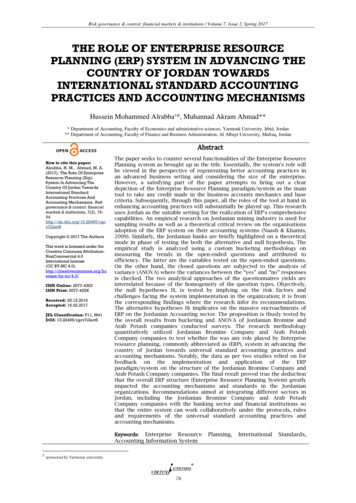
Transcription
Risk governance & control: financial markets & institutions / Volume 7, Issue 2, Spring 2017THE ROLE OF ENTERPRISE RESOURCEPLANNING (ERP) SYSTEM IN ADVANCING THECOUNTRY OF JORDAN TOWARDSINTERNATIONAL STANDARD ACCOUNTINGPRACTICES AND ACCOUNTING MECHANISMSHussein Mohammed Alrabba5*, Muhannad Akram Ahmad*** Department of Accounting, Faculty of Economics and administrative sciences, Yarmouk University, Irbid, Jordan** Department of Accounting, Faculty of Finance and Business Administration, Al Albayt University, Mafraq, JordanAbstractHow to cite this paper:Alrabba, H. M. Ahmad, M. A.(2017). The Role Of EnterpriseResource Planning (Erp)System In Advancing TheCountry Of Jordan TowardsInternational StandardAccounting Practices AndAccounting Mechanisms. Riskgovernance & control: financialmarkets & institutions, 7(2), ht 2017 The AuthorsThis work is licensed under theCreative Commons AttributionNonCommercial 4.0International License(CC BY-NC /ISSN Online: 2077-4303ISSN Print: 2077-429XReceived: 20.12.2016Accepted: 16.02.2017JEL Classification: P11, M41DOI: 10.22495/rgcv7i2art8The paper seeks to counter several functionalities of the Enterprise ResourcePlanning system as brought up in the title. Essentially, the system's role willbe viewed in the perspective of regenerating better accounting practices inan advanced business setting and considering the size of the enterprise.However, a satisfying part of the paper attempts to bring out a cleardepiction of the Enterprise Resource Planning paradigm/system as the maintool to take any credit made in the business accounts mechanics and basecriteria. Subsequently, through this paper, all the roles of the tool at hand inenhancing accounting practices will substantially be played up. This researchuses Jordan as the suitable setting for the realization of ERP's comprehensivecapabilities. An empirical research on Jordanian mining industry is used forsampling results as well as a theoretical critical review on the organisationsadoption of the ERP system on their accounting systems (Naash & Khamis,2009). Similarly, the Jordanian banks are briefly highlighted on a theoreticalmode in phase of testing the both the alternative and null hypothesis. Theempirical study is analyzed using a custom bucketing methodology onmeasuring the trends in the open-ended questions and attributed toefficiency. The latter are the variables tested on the open-ended questions.On the other hand, the closed questions are subjected to the analysis ofvariance (ANOVA) where the variances between the “yes” and “no” responsesis checked. The two analytical approaches of the questionnaires yields areinterrelated because of the homogeneity of the question types. Objectively,the null hypotheses Hₒ is tested by implying on the risk factors andchallenges facing the system implementation in the organization; it is fromthe corresponding findings where the research infer its recommendations.The alternative hypotheses Hɪ implicates on the massive encroachments ofERP on the Jordanian Accounting sector. The proposition is thusly tested bythe overall results from bucketing and ANOVA of Jordanian Bromine andArab Potash companies conducted surveys. The research methodologyquantitatively utilized Jordanian Bromine Company and Arab PotashCompany companies to test whether the was any role played by Enterpriseresource planning, commonly abbreviated as (ERP), system in advancing thecountry of Jordan towards universal standard accounting practices andaccounting mechanisms. Notably, the data as per two studies relied on forfeedback on the implementation and application of the ERPparadigm/system on the structure of the Jordanian Bromine Company andArab Potash Company companies. The final result proved true the deductionthat the overall ERP structure (Enterprise Resource Planning System) greatlyimpacted the accounting mechanisms and standards in the Jordanianorganizations. Recommendations aimed at integrating different sectors inJordan, including the Jordanian Bromine Company and Arab PotashCompany companies with the banking sector and financial institutions sothat the entire system can work collaboratively under the protocols, rulesand requirements of the universal standard accounting practices andaccounting mechanisms.Keywords: Enterprise ResourceAccounting Information System5sponsored by Yarmouk university76Planning,InternationalStandards,
Risk governance & control: financial markets & institutions / Volume 7, Issue 2, Spring 2017Jaghoub & Westrup, [2003]). The system will alsodetermine the best routing channel for shipmentbesides scheduling it. It is evident on how theprocedure which traditionally would have takenalmost a month can now be achieved in a week. Inthe company's side, an update is made to the salesand production calculate. Similarly, the franchise orsales person account is quoted by the requiredcommission.Also,thecompanymakes acomputationoftheproductioncostandprofitability. Finally, the process is all recorded in allthe relevant consolidated balance sheets, accountpayable and receivables (Schniederjans & Yadav[2014]).Enterprise systems packages provide fordifferent accounting processes disposable toenthusiast companies as follows:I. Asset accountingII. Financial ConsolidationIII. Profitability analysisIV. Profit center accountingV. General ledgerVI. Executive information systemVII. Cost element and Center analysisVIII. Standard and period related accountingIX. Cash management and forecastingX. Account receivables and payablesThe above functions will be focused into latersections in the paper in relation to the enterpriseresource planning system planning and subsequentimplementation in Jordan. Relatively, significant tothe previous, is the need to make a comparison tothe traditional ways of preparation so as to makeclear on its benefits which makes a greater scope ofthe research. Similarly, getting to know the extent towhich the enterprise resource planning system isused for standard accounting commits in Jordanpreferably backed up by a number of reasonsproceeds. Considering the system implementationbetween both the public and private companies inthe country will also create room for finding the trueview and level of acceptance by the industries ofJordan. Hence, analyzing the impacts of the systemin revolutionizing business operations.In spite of the fact that there are a fewassociations that like to add to their projects, eitherby themselves or through experts, multi-businessorganizations as of late embraced the utilization ofcomprehensive business frameworks contain a fewsub-frameworks including bookkeeping framework.These structures are known as ERP which is anabbreviation for Enterprise Resources Planning’sframework, which is portrayed by giving coordinatedincongruent results to the divisions and help themto enhance the nature of their choices and theplanning of far-reaching incorporated arrangements.1. INTRODUCTIONJordan as a country has businesses that are wellstructured and expanding into multinationalcorporations. It also has small and medium sizedenterprises that are growing exponentially and havethe need of conforming with international standardsof accounting. This will make these businesses andenterprises acquire cutting-edge advantages such aseasily entering into multi-billion dollar mergers andacquisitions.ERP has been integrated into more developingcountries faster nowadays since technology isgrowing at an expedite rate. To start off our model,it is necessary to cut into the details concerning theenterprise resource planning system. The step isvital to the realization and understanding of the restof the information cluster focused afterward in thispaper. An enterprise resource planning system issoftware achieved through a quite sophisticatedconsolidation process so as to suite all functions ofa business organization. The software is thusasserted under the company management softwarepackage. Nevertheless, it should not be confusedwith the traditional system development; enterpriseresourceplanningsystemis easedfaultytransactions and output runs on different platformsand uses a database for the repository of data (seeMabert,SoniandVenkataramanan[2011].Considering the great type functions the systemprovides functionality for, many activities bound tothe business have been simplified and relativelysupplied. In layman's, the system can be proclaimedto have automated the whole cumbersome businessbodily functions.Similar to the native human workforce, thesystem relies on input data of the enterprise formanipulation; this time redundantly fast. Theenterprise resource planning software sequentially;collects, puts in, manage and makes sense of data asrequired (Naash & Khamis, 2009). This high art ofartificial intelligence serves an industry engaging ina summon resources throughout the year. ent of inventory, sales and marketing andfinally product planning and cost, this software kindis evidently saved the industry well (Al-Akra et al.,[2009]). Besides enhancing the activities of eachdepartment, the system creates an auto loop ofcommunication between the various staff. Earlierduring the infant stages of the system, onlyfunctions of the business offices were considerednecessary to automate. However, it took veryminimal time to pull in the public most vitalfunctions such as e-commerce systems, CustomerManagement (CRM) and Supplier Management (SRM).Following is a precise operation of howaccounts are made through an enterprise system.Reckoning a company using e-commerce; forinstance, an Amman-based franchise of shoemanufacturer based in China managed well. In case,the franchisee receives an order for customizedshoes from a customer in Africa. The franchiseeprepares a quote using the enterprise system whichis sent to the client. If the customer accepts thequote, the franchise will proceed to check for theircredit limit and if enough, books the order. Aspecification of the client's preference will then besent to the manufacturer in China with a click (Al-The Motivation for this studyThe motivation of this study is drawn from the factthat despite advancement in information systemsand increased use of enterprise systems by manycompanies, Jordan has been slow to adopt thesepractices. Similar to other developing countries,Jordan harbours several national and organizationalcultures to an extent hinder the adoption ofenterprise systems. Furthuremore, the status of theeconomy in third is also a great hindrance toadopting enterprise systems considering the high77
Risk governance & control: financial markets & institutions / Volume 7, Issue 2, Spring 2017level of cost it requires for initialization (Naash &Khamis, [2009]). Third is the infrastructure, puttingthrough a nation to the cloud requires greatadvancement on the internet base development.Extensive studies on the performance of informationsystems presents contrary outcomes regarding thegains and value of enterprise resource planningsystems (ERP).Performance of IS is mainlymeasured in three main areas: quality, effectivenessand efficiency. Accordingly, this research ismotivated to explore the value of ERP system inJordanian business and accounting environmentwhile utilizing empirican test to supporting thestudy outcome. Despite the value of ERP in businesspractices having been investigated by a number ofscholars, this studies have not been adequatelyextended into accounting sector and moreparticularly in Jordanian accounting sphere. Thisstudy is therefore, set at identifying the significanceand impact of ERP in accounting within theJordanian business sector.Expanding the proficiency and adequacy of theadministration's money related administration is afocal mainstay of Jordan's financial and monetarychange process. The former thusly plans to handlethe difficulties and monetary weights Jordan isconfronting, fundamentally as an after effect ofdifferent outside stuns and the geopoliticalenvironment. As all around perceived and embracedmeasures, IPSAS empowers the general populationarea to enhance choice providing so as to makedependable money related information andupgraded appraisals of asset allotments. Jordanenterprises mostly use audit firms for theiraccounts. The practice creates quite an unnecessaryimperfection in the process which can easily besolved through an integration of the ERPS to each ofthe firms audit functions (Joshi, Bremser & Al-Ajmi,2008]). Regardless of the claims by different auditfirms purpoting to be complying with al differences on their works aredisputable. Due to the difference in size of firms andtheir level of finance; indifferences are createdbetween the audits of large firms frequently differfrom those of small ones. However, despite of theability to finance for better audits the enterpriseschoose to deliberately or ignorantly violatestandards. Therefore, employing ERPS would mean agreat remedy for the country and the industry. Theauditing process will be neutralized from the currentbiased site. Similarly, ISA- based practice manualsare sometimes not available to all audit firms hencecreating the excuse of ignorance. Enterprisesarrested for not complying with the nation’saccounting standards would make an excuse fromthe deficiency of access let alone interpretation. Thelatter would have been a no case with the existenceof the ERPS (IFAC, 2012).Many countries especially land-locked oneshave no access to reliable internet connections.Government regulation at times restricts for furthergrowth of enterprise adoption for purposes termedbest for the nation. In addition to the variousdrawbacks to the acceptance of the system, Jordanfaces an extra assess taking to point that it is anArabian country. As earlier mentioned the westernperspective of organization operations has greatlybeen merged into the enterprise system as they . Nevertheless, the extremism of theArab community in Jordan let alone the rest of Arabnations in the Middle East; dominantly Muslimcannot let through the adaptation of such adepravity to their culture (Rabaai, 2009).Enterprise Resource Planning achievementrelies on upon a consistency between the hostsociety and also its framework society. In the MiddleEast setting they highlight the requirement forconsideration regarding the IT administrationvariables, and particularly the requirement on inside of an organization. EnterpriseResource Planning innovation is additionally knownfor forcing inflexible standards of work processes.Additionally, specific practices upon workingenvironments are inflicted and it is very muchnoticed that the system requests changes toauthoritative society. It is this perspective, asopposed to any specialized deficiency; both of thea. Background to the StudyWorldwide monetary and sovereign obligationemergencies of late years have delineated the needof better budgetary reporting by governmentsworldwide and the requirement for auspiciousenhancements in the administration of opensegment assets. Actualizing IPSAS is a significantstride forward as the Ministry of Finance attempts tounderstand its vision of driving an excellent openbudgetary administration framework. Similarlyregarding an organization that adds to improvingmonetary and financial security; over the Kingdomand in light of a legitimate concern for the Jordanianindividuals (Seo, 2013). IPSAS urges open partelements to receive a collection based, rather thanthe native money based bookkeeping strategies. Theadopted pattern is of a hearty advantage as it willenhance monetary administration and expansionstraightforwardness. Resultantly, it brings about amore far reaching and precise perspective of theadministration's budgetary posit.To better understand the foreseen welfare, theGFMIS, is an electronic monetary framework thatdeals with the money related procedures of alldivisions and organizations of the Jordaniangovernment (DAI, 2015). The need resulted from ayearning to update people in general assets systemsand raise the level of administration given tospending plan foundations in Jordan. GFMIS was anenormous change upon prior, un-coordinatedpersonal computer based frameworks alreadyutilized at the Ministry of Finance and differentservices. Expanding the proficiency and viability ofthe administration's money related administration isa focal mainstay of Jordan's financial and monetarychange process. It specifically underpins the pointsof the Jordan 2025 national methodology(Schniederjans and Yadav [2014]). Recently, congressmen from the three institutions; Jordan’s Ministry ofFinance, the Fiscal Reform Project and the GFMISheld a conference of almost a week on thediscussions concerning the standards actualization.Similarly, the meeting covered on the prior and post– troubles to anticipate; before, during and afterrunning the set up planned for the project (Al-Akraet al, 2009).78
Risk governance & control: financial markets & institutions / Volume 7, Issue 2, Spring 2017item or usage groups that can fundamentallyinfluence achievement.The paper attempts to find aid from a varietyof resources for the actualization of the objective asper the generated hypothesis. Consequently,different case studies regarding the involvement ofthe Enterprise Resource Planning System in Jordanwill be amply employed for justification of thepresumption on its maturation in Jordan. Instancesof Information on various companies, howconducted their accounting practices over the yearsprior and after the system's implementation is anexcellent strategy.the corporate utilization of data innovation.Subsequently, numerous associations need toenhance their focused position by actualizing ERPframeworks.Utilizing ERP frameworks can decrease timeand aggregate expense of operations and that theERP framework has been utilized and implementedas a workable model by most Jordanian businesses.Naturally, ERP frameworks as business models areaccepted to give the fundamental data all throughthe association and even the inventory network toencourage the choice making and authoritativeexercises (Al-Akra et al., [2009]). Organizationswould benefit by such data sharing identified withinventory chains. They also would save cash andsalvage time for ERP execution in regions such as:stock magnitude, request planning ocedures, client request mix, institutionalizationof human asset data, expanding item differences,stock time conveyance and viable collaboration withinventory network.According to Beheshti (2006), munication flow all around its operationalsections and lessen production/mainatanance costs.Keeping in mind the end goal to stay effective andhold their intensity. Davenport (1998) expressed thatundertaking asset arranging Enterprise ResourcePlanning (ERP) frameworks might be the most vitalimprovement in the corporate utilization of datainnovation. Subsequently, numerous associationsneed to enhance their focused position byactualizing ERP frameworks (Grabski and Leech,2007).A Greek study by (Galani, et al., 2010) examinedclients' fulfillments concerning the impact andresultant effects of the Enterprise Resource PlanningSystems on the Accounting Information System (AIS)and the pattern acts of the accountingmanagerial fora specimen of Greek organizations. The outcomesdemonstrated that the Enterprise Resource PlanningSystems (ERP) expanded level of fulfillment forclients of the accounting information system,framework execution and quality, decrease theexpenses, and enhance the general execution of theorganizations. Another Jordanian study by (Naashand Khamis, 2009) tried the effect of accountants increating accounting information systems on theframeworks productivity and application on moneyrelated execution, besides digging into the impact ofthe utilization of those frameworks on the moneyrelated execution for the Jordanian modern firms.The uncovering showed that there is anessentialness measurable relationship ing data frameworks and the execution ofthose frameworks. Resultantly, there are crucialfactual contrasts between performance pointersprior and after the utilization of the frameworkaside from deals working wage (Nordheim, 2009).Supplementing the intensity of the role ofAccounting Information Systems (AIS) through TheERP, a full content of all journals recovered trashedin the definite inquiry of the information andaccounting system records inspected by requiredaccountants together with the bookkeeping dataframeworks diaries were liable to examinationkeeping in mind the end goal to distinguish their2. LITERATURE REVIEWNumerous researches and studies have beenconducted over the years in Jordan and other MiddleEast nations regarding the involvement of theEnterprise Resource Planning System in mostcompanies operations. Resultantly, questions mayarise as to why Jordan is the picked setting andmore focus by studies lies on them regarding theincorporation of ERP system. Answering to thequestions are various reports by different studies; asthey will be highlighted in this section (Jordan[2009]). Nevertheless, pointing out to that regard isthe fact that Jordan is a known third world countrywith cultural influences on their economy. As such,conducting a study on the issue would clear up theuncertainty of the system’s acceptance andreliability in the region. The section however opts togeneralize the studies to a common look due to thenumerous accounts of the issue by researches.Among various exact studies which have exploredthe relationship in the middle of ES andadministration bookkeeping (Al-Akra et al, 2009).The inefficiency of theories and the constrainedexperimental proves on these issues have made theneed to lead preparatory examination interviewswith organizations managers implementing ERPframeworks. Resultantly, exploratory meetings wereutilized to encourage the examination process andthe overview plan. Fundamentally, the meetings havehelped Enterprise Resource Planning to organize thequestionnaires utilized as the instrument forinformation gathering. In particular, interviews withtwo noteworthy ERP suppliers and two organizationsembracing ERP frameworks have helped in buildingup the important issues and deciding the course ofthis study. The meetings were directed utilizingopen-finished inquiries covering issues, for instance;purposes behind ERP adoption, the merits attainedand changes acquired the accounting process. Arundown of elements to consider in connection withERP benefits and conceivable changes in thebookkeeping forms have been created from thosemeetings and the appropriate case writings(Nordheim, 2009).According to Beheshti (2006), munication flow all around its operationalsections and lessen production and maintenancecosts in the process which in turn streamlinesbusiness forms. Keeping in mind the end goal tostay effective and hold their intensity. Grabski andLeech, (2007) expressed that undertaking assetarranging Enterprise Resource Planning (ERP)frameworks might be the most vital improvement in79
Risk governance & control: financial markets & institutions / Volume 7, Issue 2, Spring 2017propriety for incorporation. To date, nship in the middle of administrationaccounting. Notably, positivist specialists more oftenthan not complete studies or analyses, whileinterpretivist analysts ordinarily lead contextualinvestigations (Booth et al. 2000). On the premise ofthe above three classes, a survey of the writing iscurrently led.An audit of thesis studies demonstrates thatthe review strategy has been utilized broadly(Nordheim, 2009). Different researches haveadditionally assisted consideration on the key partof administration viewing so as to bookkeeping ERPframeworks as empowering agents of refinedbookkeeping systems such as the; action basedcosting (ABC) and the benchmarking, balancedscorecard (BSC). In any case, following the creatorsneeded to analyze ERP clients and also non-ERPclients, select a random organization that has an ERPexperience being applied under thought (Naash &Khamis, 2009).ERPs that have extensively been evaluated andassessed have seen bookkeeping advantages thatwere found by the specialists which include;enhanced adaptability of data era, enhanced natureof reports and expanded coordination of utilizations(Al-Akra et al., [2009]). Specifically, while theprevious demonstrated that ERP executions are notessentially connected with the appropriation ofmodern bookkeeping methods, the last uncoveredthat few organizations used such procedures closeby ERP frameworks (Nordheim, 2009). ThediscoverieslikewiserecommendthatERPframeworks build the utilization of variouscustomary administration bookkeeping practices forinstance; change examination, standard costing,minor implementing and running any EnterpriseResource Planning Systems by firms is considerablya hassle as it involves quite a bulk of housekeepingtasks.The event of globalization implies that allaround utilized advances are most certainly not justto be endorsed additionally adjusted intoneighborhood societies and to their predominantstandards. There is clear potential for a socialconflict when these don't fit the receiving society'sstandards. Conflict levels on the way of life installedin the ERP package with the organization'shierarchical society has been distinguished by ZhouSivunen (2006). ERP achievement relies on uponconsistency between the host society and the ERPframework society.Implementation of an ERPframework in a worldwide situation can be dividedbecause of the internal culture of the enterprise,which is illustrative of societal culture. The way ERPframeworks are seen, treated, and incorporatedinside of the business assumes a basic part in theachievementordisappointmentoftheimplementation. At the point when a Westerncreated ERP framework is executed in a nation wherethe way of life varies extraordinarily from that of theengineer, execution might require confinement witha specific end goal to be effective. In doing as such,vital advantages of ERP frameworks might bediminished (Srivastava and Gips, 2009).Rasmy et al (2005) moreover affirmed that ERPusage turns out to be more testing in Egyptiansetting where national and hierarchical society wasconfused. These variables can result in undesirableconfiguration reality crevices, which tend to lead tofailing to meet expectations frameworks (Motwani etal., 2007; Zu et al., 2006). Unlike vances building frameworks starting with nooutside help, ERP embodies reusable best businesshones dissimilar to conventional programmingadvancement approach, which advances buildingframeworks starting with no outside help; ERPcatches reusable best business hones. All specialtyunits at various nations had their own specificmanner of doing things in light of various businessprocedures and nearby necessities produced bynational and nearby contrasts (Otieno, 2010). Hence,the allowing so as to begin arrangement must bechanged restricted arrangements and decentralizedERP executions, all together to get away from thecontentions (Zhou-Sivunen, 2006).3. HYPOTHESIS DEVELOPMENTIn the following research, examination of Jordan’sadoption to the ERP procedural system will becategorized into two dimensions. Initially, thepaper’s level of comprehensiveness calls for theneed for a relatively comprehensive design. Hence,bearing objective in justifying the system’s role inenhancingtheaccountingstandardsandmechanisms; both the null and alternativehypothesis creation will propel to the quest toexemplify the role of the Enterprise ResourcePlanning System in Jordan’s organizations. Probingour research in the null hypothesis form, thefollowing:Hₒ - Jordanian firms, notably JordanianBromine Company and Arab Potash Companycompanies, have a bunch of challenges to tackle andan equivalent risk factors involved concerningadoption of the Enterprise Resource PlanningSystem.With regard to the null hypotheses, thisresearch will derivatively expound on the issues theSystem is prone and to a degree limiting its potency.Similarly, the research would considerexamining the hypothesis in an alternative form soas to reach the positive role of ERPS in Jordan.Therefore the alternative hypothesis reckoned;Hɪ - The Enterprise Resource Planning Systemhas revolutionized the accounting organization inJordan.4. RESEARCH DESIGNIn this section, the paper presents its basicframework of research regarding the ementation in Jordan by two sectors of itseconomy; the firms and banks, distinctively. Thisstudy is going to handle the subject in twoperspectives.4.1. Theoretical ApproachFirst, the theoretical approach; where the supportingconcepts of the Enterprise Resource Planning Systemlimitations in the Jordanian economy as per (Hₒ) willbe highlighted; as well as its foreseen andexperienced encroachments in the country’s80
Risk governance & control: financial markets & institutions / Volume 7, Issue 2, Spring 2017economic sectors measured through the firms andbanks contexts as with the alternate hypothesis (Hɪ).Backing up the conceptual set up, the study usesfactual evidences from studies through raw toprocessed data frame ups. The sections are firstbuild and expounded on the paper through atheoretical methodology. Subsequently, the primaryobjective is dug into sufficiently by the definedhypothesis earlier on. First delving into the literarycriticism on Jordan’s potential on handling theEnterprise Resou
enterprise resource planning system. The step is vital to the realization and understanding of the rest of the information cluster focused afterward in this paper. An enterprise resource planning system is software achieved through a quite sophisticated consolidation process

